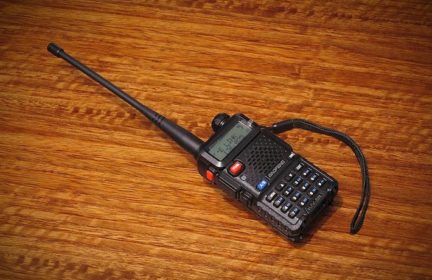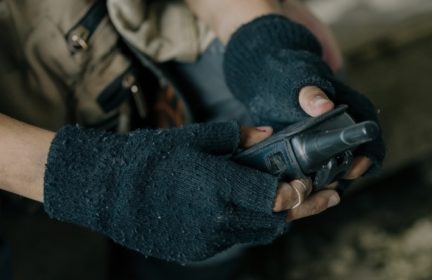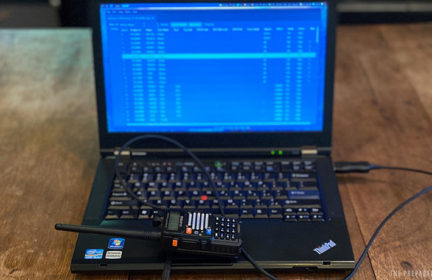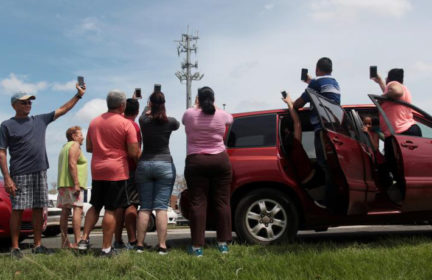How I became a newbie ham radio operator (during a pandemic)
I want to tell you what it’s been like over the last few months becoming a ham radio operator, which I did mainly for prepping purposes and with no previous background in engineering or other related subjects. I didn’t have a lot of money to throw at this project, and I wasn’t interested in a new, time consuming hobby, so my approach has been a minimalist one. In fact, for a long time I assumed that ham radio would inevitably become an expensive rabbit hole and so ruled it out for myself, concentrating instead on getting a simple NOAA radio. But then some of you on this site clued me in to the fact that it was possible to get by with a relatively cheap handheld ham radio and that there were courses and materials to help people prepare for the FCC amateur radio license tests.
Studying for the Exam
If I was going to own a ham radio, I definitely wanted to get licensed with the FCC. Currently, the lowest level of license for amateur radio operation in the US is the technician’s license. This is the minimum qualification necessary to transmit on amateur radio. (Unlicensed operators can only listen).
Passing the technician’s exam involves taking a test comprised of 35 questions on which you have to score a minimum of 75%. The questions concern various subjects such as basic electromagnetic theory (Ohm’s Law), safety, amateur radio etiquette, etc. I used two main sets tools to study for the test.
The first was the HAM CRAM course offered by outdoorcore.com for $49. It promises that students can go from zero to license in six hours using the course. (A blog post from the creator explains how to study for the ham radio exam.) The course took me longer, primarily because it uses a lot of mnemonics to memorize information that might be on the test, but I’m a person who learns best by getting some understanding of what I’m studying, so I frequently delved into various subjects more than the course would encourage me. The other tools, which work in tandem with the ham cram, are the flashcards and practice quizzes at hamstudy.org/tech2018.
All in all, I spent several weeks (maybe three?) doing a little studying on most days. The studying was comprised of going through the ham cram modules and doing a lot of practice exams, as well as occasionally looking up terms and explanations on the internet. I also had one or two Zoom calls with Joe Bassett (W1WCN), the creator of the course. It certainly took me far longer than six hours, but I never felt overwhelmed or inundated.
Call me obsessive, but one of the things that helped me most to get my practice test scores up was going through every single flashcard in the total pool of 400 and something and reviewing every answer I got wrong. After doing that, my test scores went up dramatically until, by the end, I was routinely getting scores in the mid to high 90s.
I must say that getting up to speed with the test did not make me feel that I had learned electromagnetic theory or that I would immediately be able to sit down and operate a ham radio. Apparently, that’s okay. Joe says that the test doesn’t measure aptitude for operation, so much as it does aptitude for learning.
Taking the Technician’s Exam (During the Pandemic)
After the studying comes the exam itself. First you have to find a radio club or other organization that administers the exam and sign up for one of their sessions. (The club charges some money for this — I believe $10 in my case and the FCC also charges $15 for issuing the license). I found my session through hamstudy.org. My test was administered by GLAARG (Greater Los Angeles Amateur Radio Group), about which I had read positive reviews.
Taking the exam during the pandemic is a surreal and painstaking experience. I can’t speak to how it was done in the “before times,” but apparently it was usually in a large classroom. During covid though, people have to take the exam remotely and all manner of mechanisms are put in place to make sure that nobody cheats. The clubs display a plethora of rules for test takers on their pages, some of them in bold and red, looking rather intimidating. The rules try to exert as much control as possible over the remote test environment. There are rules about cameras, calculators, mouse devices and room setup — and the rules are not the same for every club!
To begin with, you have to take the exam in a space with no pets and no other people and one with a closing door. The space also has to be free of clutter. All these requirements together immediately ruled out most spaces in my house, as they do for a lot of people. (I considered doing the test in the kitchen, but it has no door.) Many of the organizations that hold these exam sessions helpfully suggested doing the test in the bathroom, which I actually did!
Many organizations administering the exam require the use of two cameras — one pointing at your head and the other at your hands, to make sure you don’t cheat. I did set up two cameras (by attaching my cell phone to the back of a chair with a rubber band!), but it turned out that GLAARG was a little less paranoid than most clubs and only required one camera.
Exam takers are let into the general Zoom session in the order they asked to be admitted, so it’s good to come to the session early to avoid a long wait. First stop after being admitted is the breakout room where an officer of the club explains how the test will proceed and then does a preliminary inspection of the space with each applicant, one at a time. We had to point our camera at the ceiling and swivel it all around the room (bathroom, in my case) to let the examiners see that there are no papers hanging around with answers to test questions. The examiner looked at our computer and our mouse. We were also told earlier not to look away from the screen in any manner that would suggest that we are looking somewhere or to someone for answers.
After this introduction we were let in one by one, each to our private exam room. Three examiner observers were present there for each one of us. They performed a second inspection of the space, much like the first. After this, the test itself was straightforward and proceeded in the same format as the study quizzes, which were familiar to me by then. The examiners are there to monitor the test takers and give them instructions. The actual test, once you start it, is administered by the software itself and looks very much like the practice quizzes with exactly the same wording of the questions. The online test is also graded immediately by the software, so you know right away if you passed and how many answers you got wrong. I was happy to pass with a pretty high score. From there all I had to do was wait a few days for the FCC to issue me my license and call sign. That was exciting.
These Are Not Your Childhood Walkie Talkies
I got my technician’s license in January. By this time I had two handheld radios in my possession (the Yaesu FT-60R and the BaoFeng BF-F8HP) which I had been asked to review, so I had to learn how to use them first. Here’s one thing to consider if you’re thinking about getting a ham radio: these are not your childhood walkie talkies, or even a CB radio your parents may have had in their car if you’re of a certain age. If you are getting a ham radio for use in emergencies, don’t think that you’ll be able to pull it out with minimal skills and training and start using it on the spot. You don’t need to become an expert at ham radio, but you do need to learn at least basic use of your equipment and practice with it with actual people.
Having to write a review of my handhelds had its pluses and minuses for me. On one hand it meant that I really had to learn the ins and outs of these two radios, which I might not have done to quite such an extent if I was just learning to use them for myself. On the other hand, I learned a lot. Mainly, I read the manuals for both radios, played with the knobs and buttons and asked Joe Bassett lots of questions, some over email and some over Zoom. Having him to mentor me has been extremely helpful.
At the end of the day I will be keeping the Yaesu FT-60R. I have also been playing with the Echolink app on my smartphone. Echolink software allows licensed ham radio operators to communicate over the internet. I was initially skeptical about the value of this. Don’t we have email and chat and social media for that now, not to mention Zoom? But it turns out it has its uses.
On a purely frivolous note it’s kind of fun to tune into stations across the globe and hear ham operators talking to each other in Afrikaans or listen in on a meeting of hams in Australia. It’s a different slice of life than you might find on websites or on social media. Also, however, Echolink allows me to connect to remote stations and participate in activities with groups which my little handheld radio could never reach on its own.
Finding Fellow Hams and Training
It turns out that, once you get your license and learn to use your radio, no delegation from the local ham radio community shows up at your doorstep to welcome you to the club and offer training. Far from it!
My interest in ham is primarily from the angle of emergency preparedness. In my area I had to dig around the local resources to find who coordinates the local ARES (Amateur Radio Emergency Service) group. This turned out not to be so easy. The local clubs have not been forthcoming with that information. In fact the local clubs have been haphazard (to put it generously) in their responses of any sort to me. If I ask several questions, they sometimes respond with enthusiasm, but no answers and sometimes not at all.
The gist of what I’ve gotten from the main ham radio club in my area is that I should join it before I get any information about what it offers or how it’s connected to ARES. To be honest this does not make me want to cough up $40/year to join! Apparently, this kind of lack of communication and followthrough is not uncommon.
With the help of my mentor I eventually did find the weekly ARES net (meeting of ham radio operators on the radio) and have been participating in it as time allows — without joining any clubs. The level of training offered by the local ARES is disappointing, however. It essentially consists of roll call over the local repeater (an amateur radio repeater is a station that amplifies and retransmits signals, allowing radios with weak signals a much wider radius of communication). The same roll call is then performed on a simplex frequency (simplex refers to direct communication on a radio frequency, not using a repeater). It’s good for a raw beginner, but doesn’t seem terribly useful for learning how to handle myself on the radio in an emergency.
Fortunately, I’ve been able to join an ARES group in Florida that IS doing some training. (This is where Echolink has been most useful.) Now, you might think, Florida? Don’t you live in California, Jonnie? I do. But training is training on a certain level. If I can learn how to follow protocol in an emergency, I might be of some use to my local hams when one comes.
In Conclusion
To sum it all up: is it possible for a person with no special previous training to become minimally proficient as a ham without spending a huge amount of money or time? Yes. Is it going to be as easy as the pros say it will be? Probably not. At least for me, ham radio did for a while take up most of my prepping time and energy, but now I think I’m coming to the end of that. Should you just get a radio and not worry about licensing or training? DEFINITELY NOT. At the very least, get your technician’s license and learn the basics of how to use your radio before an emergency strikes. Also, be aware that ham radio is a social activity and requires entry into a different culture. You will have to scope out the new turf and learn the rules, even if you do it very part time. Is it worth it? You will have to decide for yourself. For me it has been, and it’s stretched my mind.
Jonnie
KN6NHL
-
Best Replies
-
Comments (28)
-



